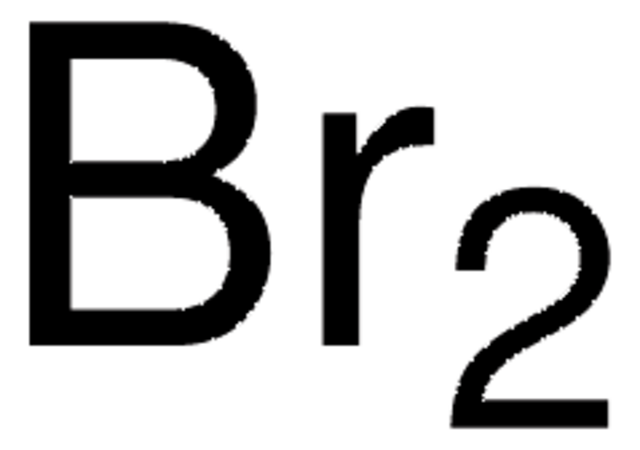295418
Hydrogen bromide
ReagentPlus®, ≥99%
Synonym(s):
Hydrobromic acid
Sign Into View Organizational & Contract Pricing
All Photos(1)
About This Item
Linear Formula:
HBr
CAS Number:
Molecular Weight:
80.91
Beilstein:
3587158
EC Number:
MDL number:
UNSPSC Code:
12142100
PubChem Substance ID:
Recommended Products
vapor density
2.71 (20 °C, vs air)
Quality Level
vapor pressure
334.7 psi ( 21 °C)
product line
ReagentPlus®
Assay
≥99%
form
gas (compressed)
bp
−67 °C (lit.)
mp
−87 °C (lit.)
density
2.14 g/cm3
SMILES string
Br
InChI
1S/BrH/h1H
InChI key
CPELXLSAUQHCOX-UHFFFAOYSA-N
Looking for similar products? Visit Product Comparison Guide
Other Notes
For 295418-500G-EU packaging: 1000 mL of steel cylinder equipped with stainless steel valve.
Recommended products
- For 295418-500G-EU: outlet fitting: DIN 477-1 no.1, Z742162 or Z742164 are the recommended regulators OR 99112 DIN 477-1 outlet valve.
- For 295418-454G: Z146706 CGA 180 Regulator OR Z146943 CGA 110 Valve with Z147095 CGA 110 to CGA 180 adapter and Z146986 washer for valve.
Legal Information
ReagentPlus is a registered trademark of Merck KGaA, Darmstadt, Germany
related product
Signal Word
Danger
Hazard Statements
Precautionary Statements
Hazard Classifications
Press. Gas Compr. Gas - Skin Corr. 1A - STOT SE 3
Target Organs
Respiratory system
Storage Class Code
2A - Gases
WGK
WGK 1
Flash Point(F)
Not applicable
Flash Point(C)
Not applicable
Personal Protective Equipment
dust mask type N95 (US), Eyeshields, Gloves
Choose from one of the most recent versions:
Already Own This Product?
Find documentation for the products that you have recently purchased in the Document Library.
Customers Also Viewed
Shujing Liang et al.
Theranostics, 5(9), 970-984 (2015-07-15)
Developing safe and effective nanoprobes for targeted imaging and selective therapy of gastric cancer stem cells (GCSCs) has become one of the most promising anticancer strategies. Herein, gold nanostars-based PEGylated multifunctional nanoprobes were prepared with conjugated CD44v6 monoclonal antibodies (CD44v6-GNS)
Differential Modulation of Cellular Bioenergetics by Poly(L-lysine)s of Different Molecular Weights.
Arnaldur Hall et al.
Biomacromolecules, 16(7), 2119-2126 (2015-06-09)
Poly(L-lysine)s (PLLs), and related derivatives, have received considerable attention as nonviral vectors. High molecular weight PLLs (H-PLLs) are superior transfectants compared with low Mw PLLs (L-PLLs), but suggested to be more cytotoxic. Through a pan-integrated metabolomic approach using Seahorse XF
Po-Yu Tsai et al.
Physical chemistry chemical physics : PCCP, 13(4), 1419-1423 (2010-11-27)
The orientation dependence of Br-atom formation in the reaction of the oriented OH radical with the HBr molecule using the hexapole electrostatic field was studied. Experimental results for the orientation dependence in the reaction were analyzed using a Legendre polynomial
Małgorzata Olejniczak et al.
The Journal of chemical physics, 136(1), 014108-014108 (2012-01-14)
We report the implementation of nuclear magnetic resonance (NMR) shielding tensors within the four-component relativistic Kohn-Sham density functional theory including non-collinear spin magnetization and employing London atomic orbitals to ensure gauge origin independent results, together with a new and efficient
Peter Comba et al.
Chemistry (Weinheim an der Bergstrasse, Germany), 18(6), 1700-1710 (2012-01-12)
The synthesis and characterization of a novel dinucleating ligand L (L=4,11-dimethyl-1,8-bis{2-[N-(di-2-pyridylmethyl)amino]ethyl}cyclam) and its μ-oxo-bridged diferric complex [(H(2)L){Fe(III)(2)(O)}(Cl)(4)](2+) are reported. This diiron(III) complex is the first example of a truly functional purple acid phosphatase (PAP) mimic as it accelerates the hydrolysis
Our team of scientists has experience in all areas of research including Life Science, Material Science, Chemical Synthesis, Chromatography, Analytical and many others.
Contact Technical Service









